Steel and alloy wheels are the most common types of rims used in vehicles today. Each type has its own set of pros and cons that you should be aware of before making a purchase.
Steel rims are popular among heavy-duty vehicles meant for driving on rough terrain and year-long use. Alloy rims, on the other hand, are a great choice if you want stylish, lightweight wheels that allow faster acceleration.
This guide will compare steel and alloy rims in detail and put them head-to-head in terms of durability, maintenance, design, and cost.
What Are Steel Wheels?

Steel rims came as standard in most vehicles until only a few decades ago. Billets of iron and carbon alloy were cut and pressed by hydraulic equipment to create this type of wheel.
These rims are known for their strength as the steel is work hardened during manufacturing. Painting and baking cycles also increase the strength of the wheel. They are formed from welded hoops that are flared and joined to stamp spiders.
The nature of their fabrication limits the spoke designs that can be applied to steel wheels. This is why most of them come with plastic hub caps to improve their otherwise plain designs.
Steel rims were preferred for decades because they were relatively cheap to make. However, their main disadvantage is that they typically weigh three times heavier than their alloy counterparts.
What Are Alloy Wheels?

Most aluminum rims are made from alloyed aluminum; hence the term alloy wheels. Aluminum is combined with copper, manganese, and silicon to achieve the desired strength and characteristics of the product.
The combined strength and malleability of these materials make it possible to create different designs and spoke styles. However, these rims are more prone to damage if they accidentally hit the curb.
Most cars and trucks are fitted with forged or cast aluminum wheels. The former is hammered or forged under pressure into shape, while the latter is cast by pouring molten aluminum into a mold. Fast and easy fabrication means lower manufacturing costs, which made it possible to make alloy rims standard in most modern vehicles.
The Pros and Cons of Steel and Alloy Wheels
| Attributes | Details | |
|---|---|---|
| Steel | Aluminum Alloy | |
| Durability | Prone to dents and scratches | Can withstand abuse |
| Weight | – 3x heavier – May reduce fuel efficiency | – Lightweight – Contributes to better fuel economy |
| Functionality | – Workhorses – Heavy-duty vehicles – Off-road vehicles – Year-round driving | – Daily drivers – Performance and custom vehicles – Show vehicles |
| Spoke designs | – Limited – The raw metal is typically covered by hubcaps to improve looks | – Wide variety available |
| Available finishes | – Painted – Powder-coated – Chrome-plated | – Painted – Clear-coated – Bare polished – PVD finish – Chrome-plated – Powder-coated |
| Cost | Starts at around $50 | $100 and above |
Rim Designs
Both types of rims come in various finishes that fit different styles. You may opt for a chrome finish for a flashy premium look or choose from a wide selection of colors if you want your wheels to pop.
How to Choose the Right Rims for Your Vehicle
Most people focus on design and looks when choosing a wheel for their vehicle. While these are important things to consider, there are a few other details that you shouldn’t overlook when selecting new rims. Here are a few things you should keep in mind.
Choosing the Right Fit
Knowing your car’s correct wheel size is critical to finding the right rims for your vehicle.
Among the factors you’ll have to consider for fitment are lug pattern and offset. Getting replacements with the incorrect pattern can cause alignment issues as well as driving and handling problems.
If you aren’t sure what wheels will fit your vehicle, it’s best to consult an expert.

Functionality
Different sizes and types of rims will help you achieve the kind of performance you wish to get out of your wheels. If you’re happy with how your vehicle currently drives, save yourself the trouble and stick to the same size that you already have.
If you wish to improve your car’s acceleration and cornering, you may consider going larger on the diameter of your rims. Just keep in mind that these may wear out faster.
You can also choose to select a smaller diameter to maximize ride comfort, although this may have a negative impact on your car’s handling.
Any information provided on this Website is for informational purposes only and is not intended to replace consultation with a professional mechanic. The accuracy and timeliness of the information may change from the time of publication.






























